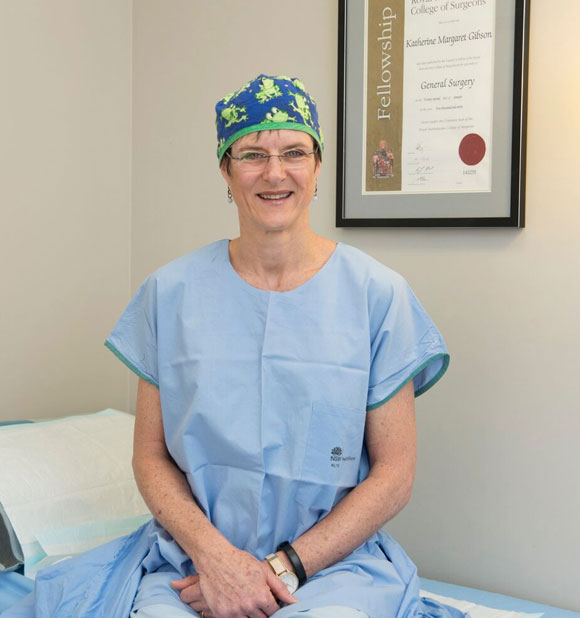What is colorectal cancer?
Colorectal cancer is cancer that starts in the colon or rectum, which are parts of the large bowel. Colorectal cancer is also called bowel cancer.
Colorectal cancer is one of the most common types of cancer diagnosed in Australia. It is mainly diagnosed in people over 60 years.
Colorectal cancer often starts as a polyp on the inner wall of the colon or rectum. These polyps tend to occur as people get older. Over time (years), some polyps turn cancerous.
If untreated, the cancer spreads deeper into the bowel wall. It can then spread into lymph nodes and later to the liver or lungs.
Bowel cancer is highly curable if found early. So please contact Dr Kate Gibson for a screening if you are worried about colorectal cancer, she is available to see patients in Liverpool, Campbelltown, Burwood and the surrounding areas.
Screening for colorectal cancer
Screening is a process of looking for a problem before any symptoms occur.
The most widely used screening method for colorectal cancer is the faecal occult blood test (FOBT). Both cancers and polyps bleed, but in such small amounts that you can’t see any blood. The FOBT picks up minute amounts of blood in your stool.
The Australian Government currently offers free FOBT kits to people turning 50, 55, 60, 65, 70 and 74. To be eligible for a free test, you need to have a Medicare card or a Veteran Affairs card.
If your screening test is positive, you may need to have further tests to see if you have colorectal cancer. These are called diagnostic tests.

What are the symptoms of colorectal cancer?
There are three main symptoms of colorectal or bowel cancer:
- blood in the stools – that occurs for no obvious reason and persists
- change in your bowel habits – such as persistently going more often with looser stools
- lower abdominal pain or bloating – often after eating.
Symptoms can be very subtle and you may not feel unwell. As colorectal cancer symptoms can occur with other conditions (e.g. IBS, anal abscess), it is important to report any symptoms to your doctor.
What causes colorectal cancer?
We don’t know exactly why some polyps become cancerous. We do know that some things increase the risk of you developing colorectal cancer. These include:
- older age – bowel cancer is uncommon in people under 50 years
- genetic factors – having a first degree relative with bowel cancer increases your risk. The specific genetic disorders familial adenomatous polyposis and Lynch syndrome also increase risk
- environmental factors – obesity, drinking too much alcohol, not eating enough fibre, smoking, and eating too much red or processed meat may increase your risk.
How is colorectal cancer diagnosed?
Your doctor will ask you about your symptoms, your lifestyle and if you have a family history of bowel cancer.
During a physical examination, your doctor will feel your abdomen and probably perform a digital rectal examination. This is where your doctor inserts a gloved, lubricated finger into the anal canal and feels for anything abnormal.
Your doctor may recommend further testing such as:
- blood tests – including checking for iron deficiency anaemia, which can occur due to bleeding from the cancer
- Gastrografin enema
- colonoscopy – which is performed under sedation, in a hospital by a colorectal cancer specialist. Biopsies may be performed during the test
- CT scan of your colon and rectum.
If cancer is confirmed, further testing is done to check if the cancer has spread. These tests may include a CT scan or MRI scan of your chest and abdomen.
The results of all the tests are put together so that the cancer can be staged. Staging allows your colorectal specialist to work out the best treatment for you.
The stages are:
- Stage A – the cancer is confined to the bowel wall
- Stage B – the cancer has spread to the outer surface of the bowel wall
- Stage C – cancer is found in lymph nodes near the bowel
- Stage D – cancer is found at distant sites, for example, in the liver or lungs.
How is colorectal cancer treated?
Surgery is the main treatment for colorectal cancer. Chemotherapy is sometimes used, but radiation therapy is rarely used.
Surgery
During surgery, your colorectal cancer specialist removes the cancerous part of the colon. The surrounding tissues including lymph nodes are also removed.
In most people, the two cut ends of the colon can be connected together straight after the cancer part has been removed.
In some people, the colon cannot be re-joined immediately. In this case, the colon is stitched to an opening in the skin of the abdomen (this is a colostomy). A bag is worn over the opening to collect stool. Sometimes the colon is joined together, but in order to protect the join a loop of the small intestine is stitched to an opening in the skin of the abdomen (this is an ileostomy). The bowel motion is diverted into a bag, allowing the join in the colon to rest and heal.
The colostomy is often temporary and the two ends of the colon can often be joined after several months. An ileostomy can also be closed after a few months, allowing the bowel to return to working the usual way.
Chemotherapy
Chemotherapy is medicine that slows or stops cancer cells growing. Chemotherapy can eliminate the cancer cells that remain in the body after surgery.
Your colorectal cancer specialist will discuss treatment in detail, with you including what happens afterwards.
